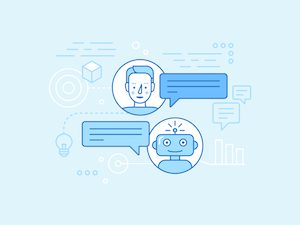How AI is Transforming the Workforce
How do you feel about having a voice assistant based humanoid conduct your next interview? What about a Chatbot answering your questions instead of a human customer service representative? As hypothetical as these situations may seem, many businesses are adopting these practices in order to be more efficient. According to LinkedIn Global Recruiting Trends, businesses claim the adoption of AI into the workforce has increased efficiency, and assists in recruiting, hiring, and matching candidates with appropriate positions. While it may unsettle you thinking about robots taking over the workforce, they may actually be making it a better place in the long run.

Will an AI enabled Automated System Conduct My Next Interview?
What may be even more shocking than having a smart system conduct your next job interview, is that it is possibly more effective than having a human perform it. Many companies, including Goldman Sachs and Unilever, are adopting this practice specifically early on in the recruiting and hiring stages. This allows hiring managers to see a wider pool of applicants than would be humanly possible. An AI enabled automated system has the capacity to interview thousands of applicants and generate a pool of qualified candidates. Some companies have adopted a practice in which applicants are interviewed and then are matched with the most suitable position. The process is quite intricate. These smart systems are programmed with algorithms to monitor body language, tone, level of confidence, and even micro-expressions such as frowning. Applicants respond to questions that appear on a screen and record them using a webcam or phone. This process is said to cut hiring time in half,however is considered to be at its early adoption stages in the workforce.

Chatbots
Another popular adoption of AI into the workforce is a Chatbot. Chatbots are programmed applications of artificial intelligence used to conduct conversations with humans. Using natural language processing systems and keywords, phrases, and patterns from programmed databases, Chatbots are designed to simulate human behaviour in a conversation. Applications such as Google Assistant and Alexa are modern day examples of Chatbots many of use every day. Typically, these applications are used for customer service and support but are now being adopted by other departments such as human resources and marketing. The purpose of this is to spend less time answering questions that could easily be answered by a chatbot. For example, a question such as “where is my order?” can be answered by a Chatbot with the proper information (order number, customer name etc.). Therefore, employees can spend time on more novel tasks that cannot be performed by machines.
Why?
So overall, what is the reason for this disruption of AI within the workplace? Remarkably, the adoption of these new business practices will, and already have, had an immense impact on productivity, efficiency, and accuracy in the workplace. These applications are eliminating repetitive administrative tasks, improving recruiting, selecting and hiring processes and enhancing the candidate experience. The capacity of knowledge and ability to excel at frequent, high-volume tasks makes AI a desirable application to have in the workplace. For example, AI can create more accurate job descriptions as well as do a better job matching candidates for appropriate positions which can reduce turnover. Conclusively, AI can solve some of a business’ toughest challenges and assist in achieving its strategic goals and objectives.
What’s Next?
So where do we go from here? Will we start to lose our jobs to machines? Well, possibly. However, artificial intelligence will create new jobs, new departments, and new positions. In contrast, humans will always be needed in certain areas of the workplace. For example, doctors, lawyers, and accountants will constantly be needed by society due to their ability to solve complex problems never before seen and tackle novel situations. Moreover, machines need to learn from large data sets and this puts a limit on the human tasks machines can automate. However, as the development of artificial intelligence advances, we will see more presence of the technology as time goes on. In essence, AI is actually making the human aspects of the workplace more important;thus, allowing companies to focus more on customer experience, employee engagement, and workplace culture.
